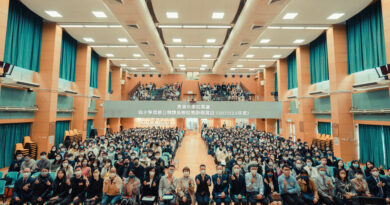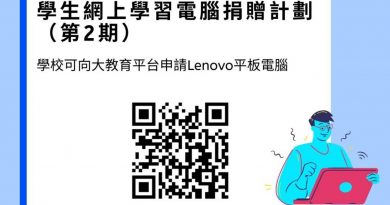香港教育還有明天?- 回應2015年施政報告 21 Jan 2015
香港中學校長會義務總幹事黃謂儒
文章刋登於明報論壇2015年1月21日
走出2014?
2014是香港社會動盪、分化、撕裂的一年。整個社會最關心的議題是:我們怎樣走出陰霾,重建未來?
在過去多個月,香港學校經歷了不少挑戰,面對校園以內及以外的各種壓力,一直秉持教育理想和專業,在艱難的平衡中以愛心守護每一個學生的成長和學習。
我們不得不問:究竟香港需要甚麼樣的教育?究竟二零一五年施政報告為我們的未來教育勾劃出一幅甚麼樣的藍圖?究竟香港教育還有明天嘛?
(一) 由上而下的公開指責是否教育的好方法?
施政報告公佈,當中引言的第10段點名批評香港大學學生會的官方刋物《學苑》,直指其「主張香港『尋找一條自立自決的出路』」,須「警惕」,更須「勸阻」。在此無意評論負責編撰《學苑》的學生是否在推動「港獨」、或是以文章表達對政治發展的意見是否等同推動「港獨」,只是特首先生竟在一年一度嚴肅的施政報告內,對一群仍在學的大學同學作出公開的指責,對一份學生刋物口誅筆伐,除感到極度奇怪、不安外,還有一些看法:
– 個人已從事教育工作三十多年,從第一天投身教育開始,已深知老師個人的權威及權力不能濫用,縱使學生真的犯了大過錯,在教導或訓斥學生,均須放下個人的主觀及情緒,從學生角度去協助他們繼續健康成長,在眾人面前指責學生,絕非恰當的方式。而更重要的是,問題不會因此解決,對立更不會因此消弭。
– 教育在於培養孩子、成就孩子,我們珍惜孩子的獨立思考、創意,我們鼓勵他們關心社會、國家、世界。在孩子成長的過程中,在他們的刋物中對不同國家體制作出探討,甚或總結個人及團體的意見,無論施政者是否認同,無論是對是錯,又何須視如洪水猛獸?又是否必須在「施政報告」中加以公開鞭韃?
(二) 兩極對立能否造就良好的教育環境?
尚記得特首梁振英先生當年競選成功後,曾表示從當天開始,便沒有「唐營」,也沒有「梁營」,有的只是「香港營」。但觀今天發展,「香港營」的出現似遙遙無期。施政報告《引言》第一段,提出此刻我們所面對的抉擇:政制上「落實普選」或是「原地踏步」、經濟上「發展」或是「停滯」、民生問題上「改革」或是「因循」。行文用字,將香港面對的複雜問題簡單化為「對」或是「錯」之間的選擇。若將今天在政治、經濟、民生政策上提出不同於政府政策的意見者簡單地歸類為「錯」、「反對者」,團結一致的「香港營」又何時才能出現?在紛擾和對立當中,學校要為學生營造最好的學習環境殊不容易。個人仍然相信,特首先生及其團隊,是最具責任、最有能量和在最恰當的位置去消解社會分歧,讓學生可以在一個多元、民主、文明、兼容、具活力及文化氣質的社會大環境中學習。
(三) 滿足主觀願望的行政指令能否對應教育目標?
2015年施政報告以「重法治 掌機遇 作抉擇」為主題,較偏重在政治方面的論述,在教育施政表面上依從2013年施政報告所提出的「休養生息」路線,但其中幾項新舉措卻令教育界覺得有點奇怪:
– 施政報告的152和153段,提及將更新及強化科學、科技及數學課程及學習活動,亦會更新中國歷史及世界歷史的課程內容。不同學習課程的更新、學習內容的變動,是教育局和課程發展議會的恒常實務工作,過去絕少在施政報告中公佈。這次學科內容的改動竟高調地出自施政報告,是否表示相關課程在目標、內容、學習過程和評核等各方面都會有根本性的改動呢?背後是否有政治因素的考量呢?
– 同樣惹來諸多懷疑的是大幅增加與內地學校締結姊妹學校的數目,與及加強與香港青年人與內地交流合作的施政方向。教育界並不反對香港學生與內地多作交流,但若如施政報告157段所述及的透過交流活動以「拓闊視野」為主要目標的話,則只會資助學生在中、小學階段最少各一次到內地交流,在思維上便有所局限,不利於學校透過境外學習活動,為學生製造最佳的學習過程和創造最佳的學習效果。
– 從教育專業立場看,所有學習活動都要對應教育目標,「締結姊妹學校」必須對雙方學校的師生有教育增益,絕不能成為政府或辦學團體的「政績工程」,也不能成為政府評估教育界的一項政治標準。我們認為教育局要尊重學校的自決權和容許學校靈活運用相關的資助,特別是「締結姊妹學校」應促進雙方雙向的交流,而不是只資助單向的香港師生到內地交流。
(四) 漠視業界多年提出的教育現實問題可否提升教育質素?
施政報告中的教育政策最讓人失望的,不是它提出了甚麼政策,而是它沒有提出任何政策去解決一些根本性、急切待決的問題:
– 十多年前推出的教育改革藍圖,是否正逐步實踐?當中提出的一些教育大原則有否達成?是否需要修訂?
– 不同類型、不同需要的學生是否得到適切的照顧?教育的公平性及均等性是否得以維持?若課程的編撰、考評的設計、師資的預備、多元出路的安排均未能到位,單單的現金資助,與及零散的課程及學習安排,是否能讓一些後進生、具特殊學習需要的學生、與及非華語學生得到真正公平學習及多元發展的機會?
– 直資學校與一般官津學校的制度及政策安排如何拉近?讓不同學制的學校能在一個公平的環境中,服務不同需要的學生,而不是讓貧窮線下的孩子向上流動的機會減少。
– 還有學童人口下降問題、教學語言分流問題、資助大學學位不足問題、教師工作量問題等等,又待何時討論、解決?
香港最需要甚麼樣的教育?
2014是香港社會動盪、分化、撕裂的一年!
整個社會都在期盼在特首施政報告中能顯示端倪,特首先生及其團隊能如何有效地帶領香港走出陰霾,迎向明天。綜觀香港當下的社會處境與定位困局,以及全球化教育變革的大趨勢,我們認為政府當局必須珍惜香港教育的既有優勢和良好的專業傳統,開放更多教師空間、提供更多更到位的資源推動學校教育的持續發展、創新和改進,實現香港21世紀的學校教育目標:「讓每個人在德、智、體、群、美各方面都有全面而具個性的發展,能夠一生不斷自學、思考、探索、創新和應變,有充分的自信和合群的精神,願意為社會的繁榮、進步、自由和民主不斷努力,為國家和世界的前途作出貢獻。」
香港的明天,取決於今天的教育,2000年的教育改革至今快十五年了,香港人再沒有時間不斷糾纏於言辭與意識之爭,是時候以教育回應教育、以教育領導教育,以人為本,為每個學生的未來著想,時不可失。
Newspaper article on our views on the Chief Executive’s Policy Address 2015
Written by Mr Wong Wai Yu, Honorary Executive Secretary of HKAHSS 22/1/2015
Summary
2014 was a disturbing year for Hong Kong when everyone was concerned if we could get out of the dark clouds and rebuild our future. We in the teaching profession have tried to counteract the impact and pressure on our students by walking with them with love and professionalism. In view of the social and political conflicts around us, we ask what light the Policy Address 2015 (PA) sheds on the future of education in Hong Kong.
Open criticisms from the Chief Executive (CE) is counter-productive
In his PA, the CE criticised an article in the Undergrad, the official publication of the Students’ Association of the University of Hong Kong, for promoting Hong Kong self-determination and independence. He stressed that this must be stopped. His harsh criticism against the students and the publication caused concern and unease. Being an experienced teacher, I fully understand that even when students have done wrong, we must be objective, impartial and empathetic to help them learn and grow from their mistakes. Criticising them openly does not solve the problem, but only aggravate the confrontation.
In educating our children, we should encourage them to think independently and creatively and to care for society, the country and the world. We should not openly criticise them for exploring different political systems or publishing opinions different from that of the government. What the CE did was unnecessary and inappropriate.
Confrontation does not breed good education environment
When Mr Leung Chun Ying was elected the CE, he said that there would be no more ‘Tang camp’ or ‘Leung camp’, but only ‘Hong Kong camp’. His pledge for unity, however, is overshadowed by his opposite rhetoric in the PA. He said that politically we must choose between ‘implementing the government’s general election proposal’ and ‘staying where we are’, economically, between ‘development’ and ‘stagnation’ and on livelihood policies, between ‘reform’ and ‘stick to the rut’. But these are complex issues with no simple right or wrong answers. Dichotomising people is not good for unity. The CE and his team have the responsibility and are in the position to dispel divisiveness so that our students may grow and learn in a diversified, democratic, civilised, tolerant and culturally-rich society.
Self-serving directives defeat education objectives
The PA makes several alarming announcements on education. One of them is to overhaul the curricula of science, technology, Mathematics, Chinese history and world history. Reforming school curriculum has always been the task of the Education Bureau (EDB) and the Curriculum Development Council. It was seldom announced in a PA. We wonder if there is a political consideration behind this high profile treatment in the PA.
Equally doubtful is the purpose behind increasing the number of ‘sister schools’ between Hong Kong and Mainland schools and exchange activities between Hong Kong and the Mainland. We do not oppose to exchange activities. The objective of these activities as stated in the PA is to broaden students’ outlook. Since the government would only subsidize one trip to the Mainland during each of the primary and secondary school periods, how can the policy achieve its stated objective?
The purpose of having ‘sister schools’ is to enhance learning experience in the schools involved. It should not be used by the government or the school sponsoring bodies to boast their political performance; nor should it be used as a standard to measure the political allegiance of the teaching profession. The EDB should respect the schools’ right to make their own decisions and use government subsidy flexibly. Two-way exchanges should be encouraged instead of just subsidizing Hong Kong teachers and students to visit the Mainland.
Questions on improving education environment and quality being neglected
Most disappointing of the PA is its silence on the following fundamental but urgent issues: review of the education reform, serving students with different learning needs and abilities, equal opportunities in diversified learning and development, the gap between Direct Subsidy Scheme Schools and government and subsidized schools, student population decline, language streaming problems, inadequate university places and teachers’ workload.
To help achieve the goals of education in the 21st century, the government should respect the fine and professional tradition of education in Hong Kong, give more freedom to teachers and provide more resources to schools. It is time for the government not to dwell on semantics but to return to the fundamentals of education based on the needs and future of the students.


